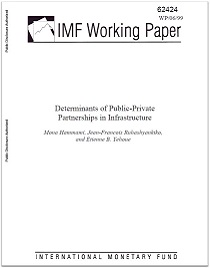Keywords
Authors: Mona Hammami, Jean-Francois Ruhashyankiko & Etienne B. Yehoue
International Monetary Fund (IMF)
2006
37 pages
This working paper presents an empirical analysis of the cross-country and cross-industry determinants of public-private partnership (PPP) arrangements. Authors find that PPPs tend to be more common in countries where governments suffer from heavy debt burdens and where aggregate demand and market size are large. Their findings also suggest that macroeconomic stability is essential for PPPs. They provide evidence on the importance of institutional quality, where less corruption and effective rule of law are associated with more PPP projects. PPPs are also more prevalent in countries with previous PPP experiences. At the industry level, they find that PPP determinants vary across industries depending on the nature of public infrastructure, capital intensity, and technology required. They also find that private participation in PPP projects depends on the expected marketability, the technology required, and the degree of ‘impurity’ of the goods or services.












